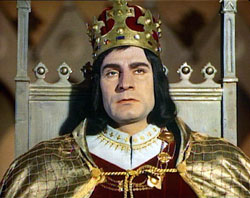Dr. Michael Delahoyde
Washington State University
RICHARD III
ACT II
SCENE i
"The second act opens with King Edward on the stage for the first
(and only) time. He appeared in Henry VI, Part Two as a
teen-age earl, and in Henry VI, Part Three as a vigorous,
sensuous King. Now he seems a sick old man" (Asimov 699). "The weak,
self-indulgent, and lascivious King Edward affords an effective
contrast to Richard and permits Shakespeare to imply that violence
and lust are brothers" (Goddard, I 36). Here, the dying
Edward insists that all family members and lords be reconciled
and vow to cooperate with one another: "Dissemble not your hatred,
swear your love" (II.i.8). (Can this kind of request really work?)
Buckingham unintentionally curses himself prophetically:
When I have most need to employ a friend,
And most assured that he is a friend,
Deep, hollow, treacherous, and full of guile
Be he unto me! This I do beg of God,
When I am cold in love to you or yours.
(II.i.36-40)
Richard arrives late but also takes the vow, adding, "I thank my
God for my humility" (II.i.73). He then reveals the news of
Clarence's death and Edward's reprieve arriving too late.
Edward is stricken. When the Earl of Derby arrives and requests
a pardon for a servant's supposedly justifiable homicide, Edward
laments, "Have I a tongue to doom my brother's death, / And shall
that tongue give pardon to a slave?" (II.i.103-104). He remembers
Clarence's help at Tewksbury: "When Oxford had me down, he rescued
me" (II.i.113). He rails at the others present, none of whom
reminded him of Clarence's service or spoke up on his behalf.
An enfeebled Edward needs help being escorted off.
Richard draws Buckingham's attention to the supposed guilty looks
of the Woodvilles.
|
SCENE ii
Clarence's kids (Edward and Margaret Plantagenet), their
grandmother the Duchess of York (Richard's mother), and the
newly widowed Queen Elizabeth melodramatically mourn the deaths
of Clarence and now Edward too in a rather stilted Senecan style.
Richard has gotten into the good graces of the kids, to the disgust
of his own mother. Queen Elizabeth (note!) wails:
Give me no help in lamentation,
I am not barren to bring forth complaints.
All springs reduce their currents to mine eyes,
That I being govern'd by the watery moon,
May send forth plenteous tears to drown the world!
Ah for my husband, for my dear Lord Edward!
(II.ii.66-71)
|

|
Oxford has his own Queen Elizabeth in mind partially here, and
perhaps himself as Lord Edward (Ogburn and Ogburn 1117). The
group lamentations grow rhetorically artificial, and into
stichomythia:
Elizabeth
Was never widow had so dear a loss.
Children
Were never orphans had so dear a loss.
Duchess
Was never mother had so dear a loss.
(II.ii.77-79; cf. II.ii.74-76)
The Queen's brother Rivers recommends sending for her son, the
Prince of Wales (who will briefly be Edward V): "Drown desperate
sorrow in dead Edward's grave, / And plant your joys in living
Edward's throne" (II.ii.99-100). Richard enters with Buckingham
and some others, and soon it is agreed that to avoid factions
and strife, only a few should go to fetch young Edward. When
Buckingham is alone with Richard, he urges that they go themselves
in order "To part the Queen's proud kindred from the Prince"
(II.ii.150). Richard is delighted with Buckingham.
SCENE iii
Three citizens of London comment on the state of the nation.
"The characters in this scene are of small importance to the story:
they are common rather than noble, they are unnamed, and they appear
only here. For precisely those reasons, the audience can trust what
they say, since they exist only to speak their choric lines" (Garber
153). England itself is in some ways the most important "character"
in the history plays.
One is optimistic, one less confident, and one pessimistic, the last
of these offering up the traditional lament: "Woe to that land that's
govern'd by a child!" (II.iii.11). But another remarks,
In him there is a hope of government,
Which, in his nonage, council under him
And in his full and ripen'd years, himself,
No doubt shall then, and till then, govern well.
(II.iii.12-15)
They recall Henry VI being crowned at the age of nine months, and
he had "virtuous uncles to protect his Grace" (II.iii.21). (And
look how well that all worked out. They're also forgetting the
case of Richard II, which Shakespeare, the Chaucerian, would not.)
SCENE iv
The Archbishop of York, soon-to-be Queen Mother Elizabeth, grandmother
the Duchess, and the younger brother of little Edward (called the Duke
of York and historically named Richard) anticipate the arrival of
the Prince. The young boy has heard that his uncle Richard was born
with teeth, a sign of a villainous nature: "Marry (they say) my uncle
grew so fast / That he could gnaw a crust at two hours old" (II.iv.27-28).
Elizabeth notes that "Pitchers have ears" (II.iv.37).
News that various nobles have been imprisoned by Richard and Buckingham
convinces Elizabeth that tyranny and bloody times have come. She will
retreat to sanctuary with the one son and the royal seal (needed to
ratify royal decisions officially).
Act III
Shakespeare Index
